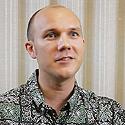Ambitious, globally connected doctoral students in the College of Language, Linguistics and Literature at UH Mānoa are receiving financial support so they can focus on their dissertations, conduct field research and complete their course work.
The Bilinski Educational Foundation's $500,000 gift is already at work, enriching the educational experience of four fellows. We invite you to hear from them directly and learn how fellowships are helping them become the future leaders in their fields.
Meet the 1st Bilinski Fellows for the Dept. of Linguistics:
 Jason Lobel's research is on the endangered languages of the Pacific, with a special emphasis on the Philippines. His dissertation meticulously documents dozens of under- or un-documented languages of various Pacific islands, and will undoubtedly be one of the most important dissertations in the area of language documentation and conservation in decades.
Jason Lobel's research is on the endangered languages of the Pacific, with a special emphasis on the Philippines. His dissertation meticulously documents dozens of under- or un-documented languages of various Pacific islands, and will undoubtedly be one of the most important dissertations in the area of language documentation and conservation in decades.
 Carl Polley's research explores the relationship between language and other aspects of human cognition, with a special emphasis on Chinese. His dissertation is on the cross-linguistic differences in metaphoric language of emotion, and how this impacts Chinese vs. American views of the world. This is particularly important given the growing stature of China and its relationships with the U.S.
Carl Polley's research explores the relationship between language and other aspects of human cognition, with a special emphasis on Chinese. His dissertation is on the cross-linguistic differences in metaphoric language of emotion, and how this impacts Chinese vs. American views of the world. This is particularly important given the growing stature of China and its relationships with the U.S.
Meet the 1st Bilinski Fellows for the Dept. of Second Language Studies:
 John Davis' dissertation examines the effect of accountability testing and assessment on U.S. foreign language education. This study focuses on tertiary level accreditation-mandated outcomes assessment. The research project will try to discover whether accreditation dictates are facilitating, enabling, or requiring foreign language educators to address educational quality through outcomes-based assessment practices. This research will provide valuable insight into how such mandates affect public higher education.
John Davis' dissertation examines the effect of accountability testing and assessment on U.S. foreign language education. This study focuses on tertiary level accreditation-mandated outcomes assessment. The research project will try to discover whether accreditation dictates are facilitating, enabling, or requiring foreign language educators to address educational quality through outcomes-based assessment practices. This research will provide valuable insight into how such mandates affect public higher education.
 Larry Davis' dissertation research looks at how evaluators of language test production make their rating decisions. He researches cognition and behavior of raters within the context of speaking performance tests. This study will illuminate how decision-making changes with training and experience. Such understanding is necessary to fully capture what test scores mean. In clarifying this rating process, interpretations of the test score results on students and prospective students can be improved.
Larry Davis' dissertation research looks at how evaluators of language test production make their rating decisions. He researches cognition and behavior of raters within the context of speaking performance tests. This study will illuminate how decision-making changes with training and experience. Such understanding is necessary to fully capture what test scores mean. In clarifying this rating process, interpretations of the test score results on students and prospective students can be improved.
Questions? / More Information
If you would like to learn how you can support UH students and programs like this, please contact us at 808 376-7800 or send us a message.